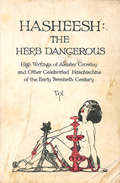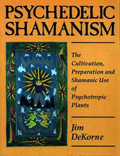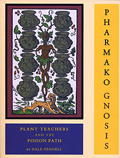Mystical Insight & Drugs
Book Recommendations for Reflecting on Gnosis
Jun 2010
Citation: Davis E. "Mystical Insight & Drugs: Book Recommendations for Reflecting on Gnosis". Erowid Extracts. Jun 2010;18:10-11.
Gnosis means mystic knowledge, not book-learning but revelation, visionary insight. We know the call and the taste of gnosis most directly from ancient Western traditions like Gnostic Christianity, Jewish apocalypticism, and Neoplatonic theurgy. All the same, the term is often used more generally to characterize mystical experience as such--both visionary journeys through other realms and, especially, first-hand intuitional encounter with the nature of reality: the whole enchilada in your mouth right now.
Given its emphasis on the direct experience of deeply transformative insights, the tradition of writing and reflecting on gnosis has influenced the discussion of psychoactive substances, to say nothing of the trips themselves. The following three texts are all wonderful explorations of the fertile tradition that Dale Pendell calls "pharmako-gnosis".
This fascinating and illuminating essay was one of four articles devoted to "The Herb Dangerous" that ran in the first volume of The Equinox, a review devoted to "Scientific Illuminism" that was edited by the notorious Aleister Crowley early in the 20th century. Crowley is a much-maligned, deeply misunderstood figure whose prophetic brilliance is often obscured beneath the less savory dimensions of his personality and biography, of which there are many. His odd brilliance is very much on display here. At this point in his life, Crowley was still a materialist in the best sense of the term, a visionary skeptic who plunged into intense meditative and magical operations even as he strove to keep his feet on the ground with humor and wit. He was an original psychonaut, speculating with the evidence provided by his own experiences, offering wise advice on titration and habituation, and never forgetting the nervous system that underlies the show.
Arguing that hashish helps "roll away the stone" from the deeper dimensions of both ceremonial magic and Buddhist meditation, Crowley identifies three main effects of the drug: the narcotic effect, the "hallucinative effect", and the "volatile aromatic effect", which he associates with the revelation of reality as nested hieroglyphs of some deeper mind. Crowley is not interested in visual or auditory hallucinations so much as this cognitive spark, which leads to one of his most thorough and exacting discussions of higher states of consciousness, including experiences of high gnosis he describes with the Sanskrit terms Atmadarshana and Shivadarshana. In fact, "The Herb Dangerous" spends a lot more time with Crowley's eccentric if provocative discussion of Buddhist Skandhas than it does with paeans to the weed.
Though Crowley is not explicit about the matter, the essay arises from his attempt to understand a remarkable experience of his a few years earlier. On October 9, 1906, he believed he had finally achieved one of the ultimate operations of magical attainment: the Knowledge and Conversation of the Holy Guardian Angel. Though he neglects to mention the fact in his official accounts, it turns out that Crowley had stimulated the breakthrough by swallowing a few grams of hash. Confronted with this fact, one can only quote The Book of the Law, the marvel from the gods Crowley had channeled in 1904: "To worship me take wine and strange drugs whereof I will tell my prophet, & be drunk thereof!"
Despite some issues with the nitty-gritty details, DeKorne's book belongs alongside Terence McKenna's True Hallucinations and D.M. Turner's The Essential Psychedelic Guide as one of the best books to emerge from the psychedelic florescence of the early 1990s. The back cover copy accurately declares DeKorne a "psychonaut", a first-person experimentalist equally engaged with descriptive mysticism and ethnobotanical lore, inner exploration and outer technique. These somewhat different goals are reflected in the structure of the book, which, after a few introductory chapters, presents hands-on information about growing, extracting, and consuming plant hallucinogens like San Pedro cactus, morning glories, and Syrian rue.
DeKorne is no chemist, and the book is unfortunately peppered with errors about extraction methods and the molecular mojo of psychotropics like Salvia divinorum and Phalaris grass. The lasting value of Psychedelic Shamanism lies instead in the author's self-presentation as a clear-eyed and deeply thinking psychonaut. The opening chapter shares a number of otherworldly personal stories--not all psychedelically inspired--whose veracity is only intensified by DeKorne's no-bullshit dissection of his own experience and motivations. (At one point he admits he was "probably clinically insane.") From these experiences, as well as his deep reading of anthropology, DeKorne tentatively embraces something like a shamanic view of reality, in which multiple dimensions and discarnate entities weave with our human realm into "One World". But from this potentially fuzzy premise, he proceeds with some startlingly refreshing thinking, especially concerning the vexing nature of the entities encountered by so many voyagers.
No romantic hippie, DeKorne acknowledges from the get-go that not all of these characters are reliable or friendly. From ancient Gnosticism he draws the concept of the archons--lower rulers who often present themselves as gods--to offer a critical view of entities as tricksters sustained by our own beliefs and adulation. "What may be a belief in the Christian Trinity or Islamic Jihad to humans, may be the equivalent of a T-bone steak to entities of the imaginal realm who depend upon that belief for their existence." What makes DeKorne's attitude particularly gnostic is not only his cool embrace of the direct non-dogmatic experience of Mystery, but his lightly held suspicions about channeled teachers, dream beasts, and other bardo know-it-alls. The freedom that gnosis provides, he reminds us, is also freedom from the gods.
By the time the poet, plant alchemist, and sometimes computer programmer Dale Pendell published his mammoth three-volume Pharmako trilogy this last decade, the world had seen at least a century of texts attempting to squeeze spiritual insight and religious correlates out of psychoactive experience. Pendell, however, managed to write a work of erudition and imagination that was not only strikingly original, but also wise. Whipper-snappers would do well to study the content of these great books, along with their form--a patchwork of citations and lore and lyric flights that express the multidimensional quality of psychoactives themselves.
Pendell's great strength lies in taking drugs and their discourse not literally, but poetically. The magic of the pharmakon that gives the work its title--the Greek notion of poison that is also medicine--is the power of metaphor itself, of the make-believe that takes us from here to there. In Pendell's hands, even science--the language of taxonomy, chemistry, and extraction methods so necessary for an authentic engagement with this material--becomes a poem of clarity and practice that grounds his more ambiguous and sometimes disturbing encounters with "the ally".
Pendell is no snob, and his "poison path" leads him to all manner of toxins, including amphetamine, heroin, and tobacco. That said, it is no accident that he reserved most of the heavy stuff for this, his third and final volume, which is devoted to materials that fall into the categories he calls Phantastica and Daimonica. Yet even as he takes (and takes on) awesome and sometimes frighteningly otherworldly chemicals like LSD, DMT, and ketamine, Pendell displaces the traditional hyperspace cowboy emphasis on "peak experience". Instead, Pendell's poison path is more holistic--less about storming the gates of heaven than traipsing around the woods and marshes where the demons and animals and lazy poets hang out. Perhaps his Zen practice inoculated him against the messianic inflation and quantum-physics literalism that mar so many psychedelic pundits. In the end, the gnosis he depicts does not lie in the flash but in all the various qualities of light and shade that surround psychoactive experiences--not just the glorious sun at midnight, but glittering onset, and the hazy dusk at the end of a long afternoon.
Given its emphasis on the direct experience of deeply transformative insights, the tradition of writing and reflecting on gnosis has influenced the discussion of psychoactive substances, to say nothing of the trips themselves. The following three texts are all wonderful explorations of the fertile tradition that Dale Pendell calls "pharmako-gnosis".

|
The Herb Dangerous: The Psychology of Hashish
by Oliver Haddo (Aleister Crowley) in Hasheesh: The Herb Dangerous, edited by David Hoye (Level, 1974)This fascinating and illuminating essay was one of four articles devoted to "The Herb Dangerous" that ran in the first volume of The Equinox, a review devoted to "Scientific Illuminism" that was edited by the notorious Aleister Crowley early in the 20th century. Crowley is a much-maligned, deeply misunderstood figure whose prophetic brilliance is often obscured beneath the less savory dimensions of his personality and biography, of which there are many. His odd brilliance is very much on display here. At this point in his life, Crowley was still a materialist in the best sense of the term, a visionary skeptic who plunged into intense meditative and magical operations even as he strove to keep his feet on the ground with humor and wit. He was an original psychonaut, speculating with the evidence provided by his own experiences, offering wise advice on titration and habituation, and never forgetting the nervous system that underlies the show.
Arguing that hashish helps "roll away the stone" from the deeper dimensions of both ceremonial magic and Buddhist meditation, Crowley identifies three main effects of the drug: the narcotic effect, the "hallucinative effect", and the "volatile aromatic effect", which he associates with the revelation of reality as nested hieroglyphs of some deeper mind. Crowley is not interested in visual or auditory hallucinations so much as this cognitive spark, which leads to one of his most thorough and exacting discussions of higher states of consciousness, including experiences of high gnosis he describes with the Sanskrit terms Atmadarshana and Shivadarshana. In fact, "The Herb Dangerous" spends a lot more time with Crowley's eccentric if provocative discussion of Buddhist Skandhas than it does with paeans to the weed.
Though Crowley is not explicit about the matter, the essay arises from his attempt to understand a remarkable experience of his a few years earlier. On October 9, 1906, he believed he had finally achieved one of the ultimate operations of magical attainment: the Knowledge and Conversation of the Holy Guardian Angel. Though he neglects to mention the fact in his official accounts, it turns out that Crowley had stimulated the breakthrough by swallowing a few grams of hash. Confronted with this fact, one can only quote The Book of the Law, the marvel from the gods Crowley had channeled in 1904: "To worship me take wine and strange drugs whereof I will tell my prophet, & be drunk thereof!"

|
Psychedelic Shamanism
by Jim DeKorne (Loompanics, 1994)Despite some issues with the nitty-gritty details, DeKorne's book belongs alongside Terence McKenna's True Hallucinations and D.M. Turner's The Essential Psychedelic Guide as one of the best books to emerge from the psychedelic florescence of the early 1990s. The back cover copy accurately declares DeKorne a "psychonaut", a first-person experimentalist equally engaged with descriptive mysticism and ethnobotanical lore, inner exploration and outer technique. These somewhat different goals are reflected in the structure of the book, which, after a few introductory chapters, presents hands-on information about growing, extracting, and consuming plant hallucinogens like San Pedro cactus, morning glories, and Syrian rue.
DeKorne is no chemist, and the book is unfortunately peppered with errors about extraction methods and the molecular mojo of psychotropics like Salvia divinorum and Phalaris grass. The lasting value of Psychedelic Shamanism lies instead in the author's self-presentation as a clear-eyed and deeply thinking psychonaut. The opening chapter shares a number of otherworldly personal stories--not all psychedelically inspired--whose veracity is only intensified by DeKorne's no-bullshit dissection of his own experience and motivations. (At one point he admits he was "probably clinically insane.") From these experiences, as well as his deep reading of anthropology, DeKorne tentatively embraces something like a shamanic view of reality, in which multiple dimensions and discarnate entities weave with our human realm into "One World". But from this potentially fuzzy premise, he proceeds with some startlingly refreshing thinking, especially concerning the vexing nature of the entities encountered by so many voyagers.
No romantic hippie, DeKorne acknowledges from the get-go that not all of these characters are reliable or friendly. From ancient Gnosticism he draws the concept of the archons--lower rulers who often present themselves as gods--to offer a critical view of entities as tricksters sustained by our own beliefs and adulation. "What may be a belief in the Christian Trinity or Islamic Jihad to humans, may be the equivalent of a T-bone steak to entities of the imaginal realm who depend upon that belief for their existence." What makes DeKorne's attitude particularly gnostic is not only his cool embrace of the direct non-dogmatic experience of Mystery, but his lightly held suspicions about channeled teachers, dream beasts, and other bardo know-it-alls. The freedom that gnosis provides, he reminds us, is also freedom from the gods.

|
Pharmako/Gnosis
by Dale Pendell (Mercury House, 2005)By the time the poet, plant alchemist, and sometimes computer programmer Dale Pendell published his mammoth three-volume Pharmako trilogy this last decade, the world had seen at least a century of texts attempting to squeeze spiritual insight and religious correlates out of psychoactive experience. Pendell, however, managed to write a work of erudition and imagination that was not only strikingly original, but also wise. Whipper-snappers would do well to study the content of these great books, along with their form--a patchwork of citations and lore and lyric flights that express the multidimensional quality of psychoactives themselves.
Pendell's great strength lies in taking drugs and their discourse not literally, but poetically. The magic of the pharmakon that gives the work its title--the Greek notion of poison that is also medicine--is the power of metaphor itself, of the make-believe that takes us from here to there. In Pendell's hands, even science--the language of taxonomy, chemistry, and extraction methods so necessary for an authentic engagement with this material--becomes a poem of clarity and practice that grounds his more ambiguous and sometimes disturbing encounters with "the ally".
Pendell is no snob, and his "poison path" leads him to all manner of toxins, including amphetamine, heroin, and tobacco. That said, it is no accident that he reserved most of the heavy stuff for this, his third and final volume, which is devoted to materials that fall into the categories he calls Phantastica and Daimonica. Yet even as he takes (and takes on) awesome and sometimes frighteningly otherworldly chemicals like LSD, DMT, and ketamine, Pendell displaces the traditional hyperspace cowboy emphasis on "peak experience". Instead, Pendell's poison path is more holistic--less about storming the gates of heaven than traipsing around the woods and marshes where the demons and animals and lazy poets hang out. Perhaps his Zen practice inoculated him against the messianic inflation and quantum-physics literalism that mar so many psychedelic pundits. In the end, the gnosis he depicts does not lie in the flash but in all the various qualities of light and shade that surround psychoactive experiences--not just the glorious sun at midnight, but glittering onset, and the hazy dusk at the end of a long afternoon.

